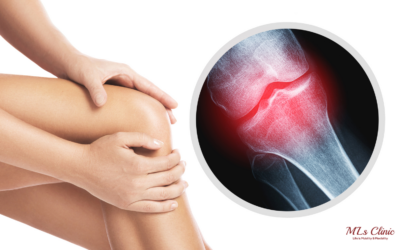Shoulder Pain after Sleeping? Here’s Why It Happens and How to Fix It?

Do you spend the night sleeping on your shoulder only to wake up with nagging pain? Does stiffness or limited movement greet you every morning? Many people struggle with shoulder pain after sleeping, and finding relief is essential for a better quality of life. Let’s dive into why this happens and, more importantly, how to fix the shoulder pain with our orthopedic specialist Dr. Preetesh Choudhary at MLs Clinic.
Common Types of Shoulder Pain at Night
Identifying the type of shoulder pain you’re experiencing can help guide you to the right treatment options with Dr. Preetesh Choudhary, at MLs Clinic. Here are some typical types of shoulder pain at night:
- Shoulder Sprain
A sprain can result from overstretching the shoulder’s ligaments or tendons. This dull, localized pain may worsen when blood flow is restricted, such as when you lie directly on the shoulder. - Shoulder Irritation
Conditions like tendinitis, bursitis, or impingement may cause persistent, burning pain that often comes with swelling and sometimes tingling or numbness. - Shoulder Nerve Injury
This type of injury can cause pain that radiates down the arm, limiting joint movement and making it difficult to find a comfortable sleeping position.
Why Does Pain Get Worse at Night?
Nighttime pain can be particularly intense because certain sleeping positions can put extra pressure on the shoulder. During the day, gravity helps reduce pressure on the shoulder joint, but at night, lying down in specific ways can lead to compression and increased shoulder discomfort, particularly if you sleep on your affected shoulder.
Common Causes of Shoulder Pain After Sleeping
Let’s break down a few typical causes of shoulder pain during sleep:
- Inappropriate Sleep Position
Sleeping on your stomach with an arm outstretched or side-sleeping with your arm under your head can lead to shoulder and neck pain. - Incorrect Pillow or Mattress
A pillow that’s too high or low or a mattress that lacks support can strain your shoulder. - Rotator Cuff Tendinitis
Inflammation of the rotator cuff tendons, also known as Shoulder Impingement Syndrome causes pain, especially when moving the arm overhead. - Shoulder Bursitis
Shoulder Bursitis is the inflammation of the bursa sac cushioning the shoulder, can cause sharp, knife-like pain, worsened by sleeping on the affected side. - AC Joint Impingement
A narrowing of the space under the acromion bone can lead to impingement, causing discomfort when lying on the shoulder. - Shoulder Arthritis, Avascular Necrosis of Shoulder, Osteoarthritis, neck injury
Simple Changes to Lessen Shoulder Pain After Sleeping
Small adjustments suggested by Dr. Preetesh Choudhary to your sleeping setup can make a significant difference:
- Upgrade Your Pillow and Mattress
A pillow that keeps the neck in a neutral position can help reduce shoulder strain. Consider a contour pillow for extra support, and ensure your mattress offers enough support for proper alignment. - Adjust Your Sleeping Position
Sleeping on your back or the opposite side can prevent strain on a sore shoulder. - Gentle Stretching Before Bed
Stretching your neck and shoulders before sleep helps relieve tension and improves flexibility.
Effective Pain Management Techniques for Shoulder Pain
For persistent pain in shoulder, consider these methods for relief:
- RICE Method
- Rest: Give the shoulder a break for 48 hours.
- Ice: Apply an ice pack 4-8 times daily.
- Compress: Use a bandage or wrap to support the shoulder.
- Elevate: Keep the shoulder elevated above the chest.
- Anti-inflammatory Medications
Over-the-counter NSAIDs like ibuprofen can help reduce pain and swelling. These can be especially useful for conditions like frozen shoulder or rotator cuff tendinitis. - Physiotherapy
A tailored exercise plan from a physiotherapist can improve shoulder stability and mobility. They may also use techniques like soft tissue massage and joint mobilization. - Corticosteroid Injections
For severe, persistent pain, your orthopedic doctor might recommend a corticosteroid injection to reduce inflammation and provide temporary relief.
When Should You See Orthopedic Doctor Dr. Preetesh Choudhary at MLs Clinic?
Visit an orthopedic doctor if you experience:
- Long-term pain that lasts for more than a few weeks.
- Sudden, severe pain
- Difficulty performing daily activities, including sleeping
- Loss of motion, swelling, or redness
Addressing pain in shoulder early can help prevent it from worsening. Dr. Preetesh Choudhary, a skilled shoulder specialist, can assess your symptoms and recommend the best shoulder pain treatment options at MLs Clinic.
Conclusion
Shoulder pain after sleeping can impact your daily life, but the right approach can provide shoulder pain relief and allow you to sleep comfortably again. For guidance on managing shoulder pain, reach out to Dr. Preetesh Choudhary at MLS Clinic to discuss your treatment options and start your journey to pain-free sleep.






